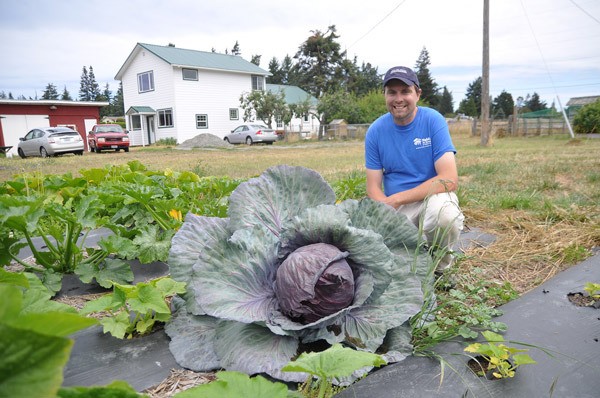Perhaps it’s too simple to call the program a win-win. How about, win-win-win-win?
Thanks to funds from the Washington State Department of Agriculture and contributors on the Olympic Peninsula, fresh vegetables and fruit from a half-dozen local farms are finding their way to food banks in Sequim and Port Angeles.
In Clallam County, the Farm to Food Bank Purchasing Program started with $2,000 from the WSDA and saw local entities and individuals match those dollars. Daniel Littlefield, food recovery coordinator for the WSU Clallam County Extension office, wrote contracts for six farms on the North Olympic Peninsula that are either new or some of the peninsula’s smaller operations.
“Not only do farms sell the produce,” Littlefield says, “but we are finding that once the connection of providing to a food program is made, the farm often ends up donating extra produce for free.”
The benefits, among others, seem to be at least three-fold, Littlefield notes: The smaller and newer farms receive easy-to-fulfil contracts that help their business while learning the ropes of wholesale purchasing.
“It’s a really nice opportunity for them to get their feet wet (in wholesaling),” Littlefield said, as opposed to only farm stand and farmers market sales.
James Burtle is in his fourth season at River Run Farm north of Sequim’s city limits. Walking by rows of red-leaf lettuce, chard, kale, potatoes and more, he noted that the Farm to Food Bank program is helping complement sales at River Run’s stand and sales at Port Angeles and Port Townsend markets.
“It’s great — it’s really important for people to help each other,” Burtle said. “It’s nice to diversify (our) outlets. We did some wholesaling last year. It’s part of the viability of any vegetable farm. From a business standpoint, (the program) would be an amazing opportunity and collaboration.”
Plus, it’s pretty easy to accommodate the contract, Burtle said.
Secondly, food bank clients in the area get fresh and free produce.
“Because of the time of year, we are expecting a lot of greens (from this program),” Littlefield said.
A survey of local food agencies like food banks indicate they would like to see leafy greens, potatoes and peas.
“The idea is that no matter what, (food banks) are going to get very nutrient-dense, very fresh food, and it’s free to the food bank,” Littlefield said.
A former chief baker for McMurdo Station, Antarctica, Hoffman helps runs The Farm, located off of Sequim-Dungeness Way, with Jennifer Jabs. The pair sell dozens of fresh eggs from cage-free chickens daily at their farm stand, but also produce eight different kinds of potatoes along with a variety of vegetables.
“I think it’s a real important program,” Hoffman said of Farm to Food Bank. “(We’ll see) less obesity, diabetes. Just to have access for them. And it’s great for the farmers.”
Finally, thanks to Farm to Food Bank and other programs, the area sees less and less food go to waste.
“The highest priority is that it’s not in a landfill,” Littlefield said, with a close second being getting it to the table for consumption.
Food waste in the trash brings more than landfill space issues: Gas emissions from the methane given off from rotting food produces more than 20 times the heat that carbon dioxide does, Littlefield said.
“That’s organic waste people could be eating,” he said.
“I can grow more vegetables,” Hoffman said, “but what am I going to do with them?”
Through the WSU Clallam County Extension office, Littlefield maintains an email list of about 300 individual gleaning volunteers who offer to take food for individual or group use when a property owner has an excess of fruits or vegetables and doesn’t want to see it go to waste.
Littlefield said his office had seen 35 individual cherry gleans (recovery of an abundance of the fruit) as of early July.
The area tends to see bumper crops of apples, pears and plums, he said.
Room to grow
Littlefield also is a coordinator of the Peninsula Food Coalition, a group of organizations that helps feed the hungry on the peninsula year-round. In addition to Sequim and Port Angeles food banks, that coalition includes food assistance programs through local tribes, Salvation Army, OlyCAP, the Boys & Girls Club summer program and other area food pantries.
Rotary First Harvest first piloted the program in 2014 and expanded it in 2015, with the WSDA dedicating funding and Rotary First Harvest in charge of administering those funds. In Clallam County, those funds found Littlefield through his AmeriCorps position with the WSU Clallam County Extension office.
Contracts with the six local farms — Agnew Alder & Aquaponic Family Farm, Blueberry Haven Farm, Chi’s Farm, River Run Farm, The Farm and Weaver Farm — were signed by June 1, Littlefield said.
The program looks like it will continue into 2017 and possibly expand, Littlefield said.
One catch to supplying the hungry on the peninsula, Littlefield said, is simple geography. While he’s able to pick up and deliver orders from Sequim farms to the food banks without much issue, cross-peninsula deliveries and deliveries to entities that don’t have cold storage units or aren’t operating much more than a day or two per week may see the food spoil anyway.
“Storage is an issue on the peninsula,” he said. “It’s geography and transportation issues (too).”
See clallam.wsu.edu for more information.
Reach Michael Dashiell at editor@sequimgazette.com.



